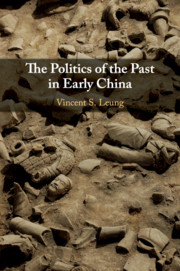Book contents
- The Politics of the Past in Early China
- The Politics of the Past in Early China
- Copyright page
- Dedication
- Contents
- Acknowledgments
- Introduction
- 1 Time out of Joint
- 2 A Parenthetical Past
- 3 Specter of the Past
- 4 The Rehabilitation of Antiquity in the Early Han Empire
- 5 Sima Qian’s Critical Past
- Epilogue
- Bibliography
- Index
4 - The Rehabilitation of Antiquity in the Early Han Empire
Published online by Cambridge University Press: 01 July 2019
- The Politics of the Past in Early China
- The Politics of the Past in Early China
- Copyright page
- Dedication
- Contents
- Acknowledgments
- Introduction
- 1 Time out of Joint
- 2 A Parenthetical Past
- 3 Specter of the Past
- 4 The Rehabilitation of Antiquity in the Early Han Empire
- 5 Sima Qian’s Critical Past
- Epilogue
- Bibliography
- Index
Summary
This chapter focuses on the first decades of the Han empire, and how members of the political elite dealt with the problematic legacy of the Qin empire. In particular, I discuss two distinct attempts at rehabilitating the idea of antiquity as a meaningful thing, and reasserting the historical field as relevant to the the construction of a viable political order. First, I discuss the oeuvre of the politician Jia Yi, and how he repurposed the model for engaging with the past in the Analects and argued for the urgent need to recognize once again the great utility of the past in devising political orders. Then, in the last part of the chapter, I discuss the writings of Lu Jia, another early Han politician, specifically his essay “Foundation of the Way.” In this text, Lu Jia presents a peculiar teleological narrative of the civilizing progress from antiquity to the recent past that culminates in the composition of the Five Classics. With its commitment and subjugation of the historical field, Lu Jia evinces a complex attitude towards the legacy of the Qin that was at once sharply critical and deeply sympathetic.
- Type
- Chapter
- Information
- The Politics of the Past in Early China , pp. 130 - 152Publisher: Cambridge University PressPrint publication year: 2019

